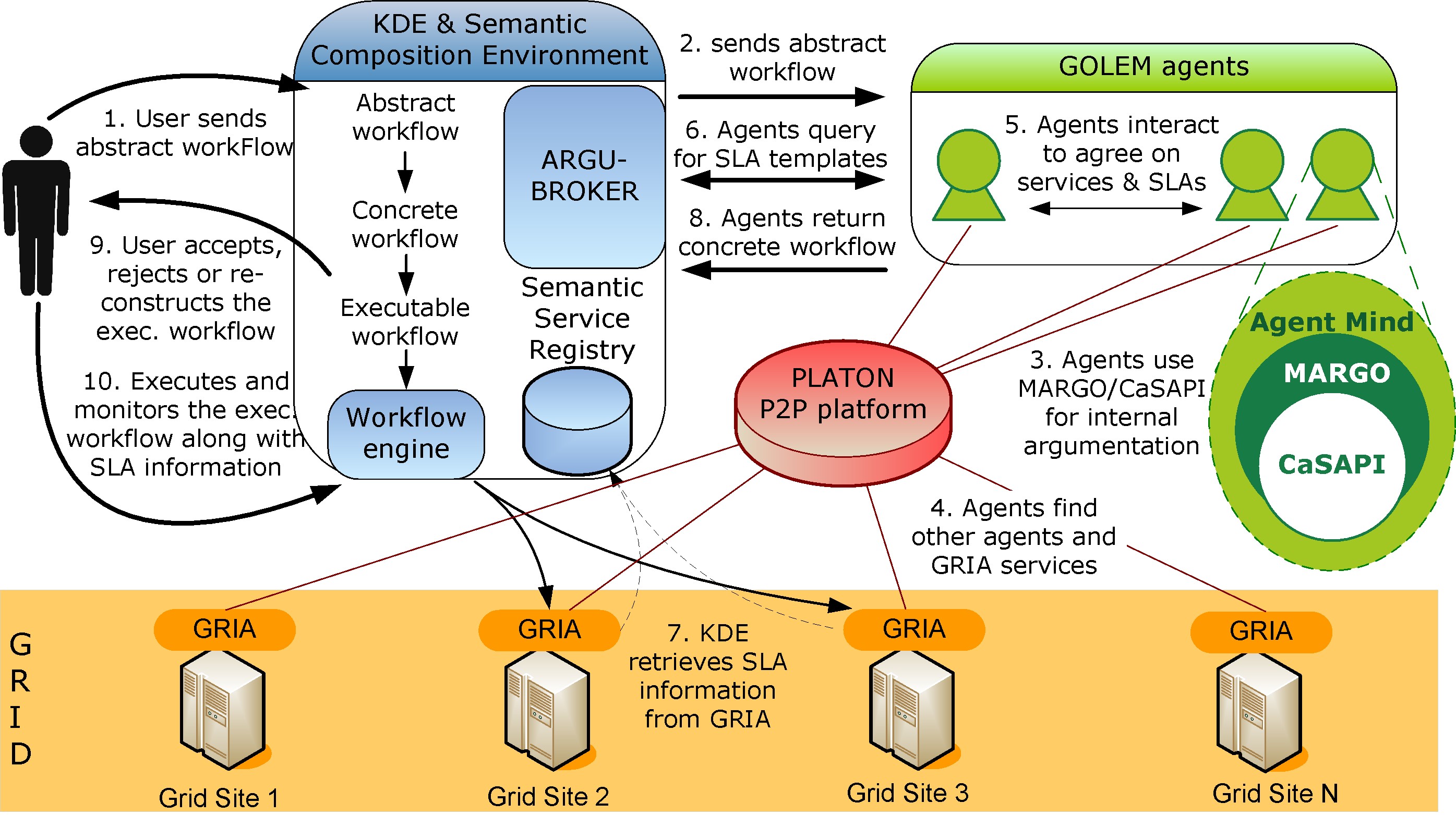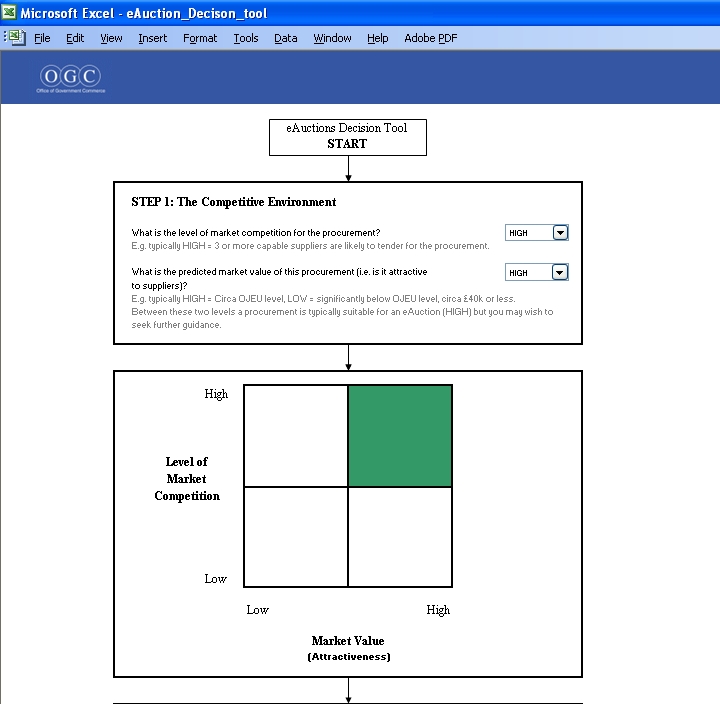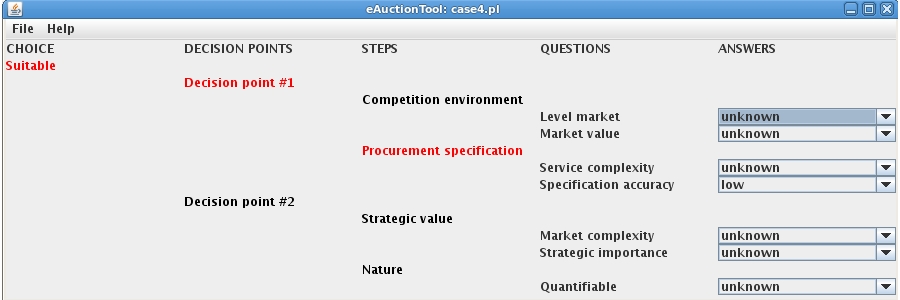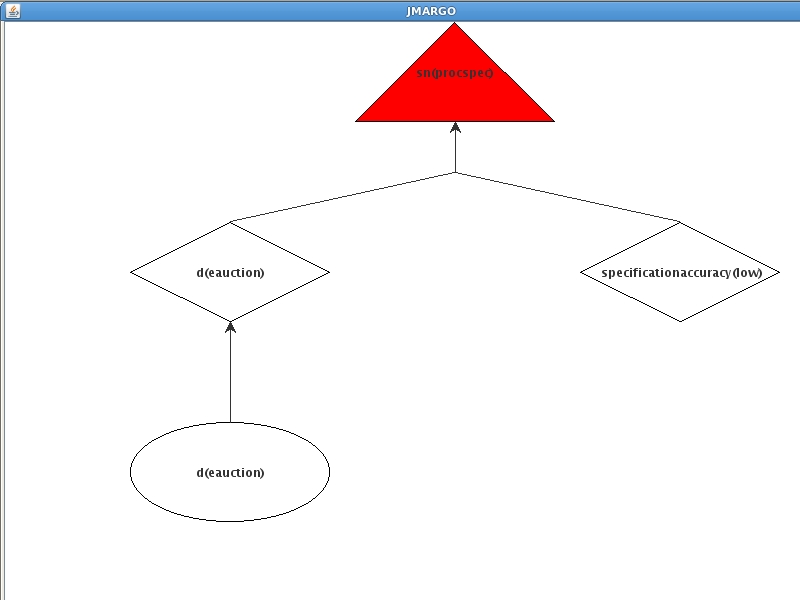| Maxime Morge* | Paolo Mancarella* | Thannasis Stournaras** |
| morge_nospam@di.unipi.it | paolo_nospam@di.unipi.it | thanassis.stournaras_nospam@cosmo-one.gr |
| * Dipartimento di Informatica | ** cosmoONE Hellas MarketSite S.A. |
| Universitą di Pisa | 90, Marinou Antipa Str., |
| Largo B. Pontecorvo, 3 | 141 21 Iraklio, Athens, Greece |
| I-56127 Pisa, Italy |
The ARGUGRID project aims at developing a Grid/Service-oriented platform populated by software agents acting on behave of service requesters and service providers. Argumentation technology is used to support rational decision making, internal to agents, as well as negotiation amongst agents. In this demonstration, we show how MARGO, the argumentation-based engine developed in the ARGUGRID project, can be used for service selection.
The ARGUGRID project aims at developing a Grid/Service-oriented platform populated by software agents acting on behave of service requesters and service providers. Within ARGUGRID, agents are associated with service/resource requesters and service/resource providers. Argumentation technology is used to support rational decision making, internal to agents, as well as negotiation amongst agents. With the support of argumentation processes, the agents decide which services can be used for fulfilling the demands of users and the constraints posed by providers, taking into account their preferences and the utilities they assign to situations, and evolving and using a notion of trust to "filter" their interactions with other entities. In this paper, we demonstrate how MARGO, the argumentation-based engine developed in the ARGUGRID project, can be used for service selection.
The ARGUGRID platform (cf Fig. 1) consists of four interacting components.
KDE is a commercial software tool developed by InforSense Ltd. This system provides facilities to build end user application as remote web services or Grid services.
GRIA is the GRID middleware that ARGUGRID has chosen to use. GRIA is a service-oriented infrastructure designed particularly to support Business-to-Business collaborations.
PLATON (Peer-to-Peer Load Adjusting Tree Overlay Networks) is a Peer-to-Peer platform supporting multi-attribute and range queries which has been developed in the project to supports service discovery mechanisms for load-balancing of peer resources.
GOLEM (Generalized OntoLogical Environments for Multi-agent systems) is an agent environment middleware which has been developed in the ARGUGRID project. MARGO (Multiattribute ARGumentation framework for Opinion explanation) is the engine developed in the ARGUGRID project used by agents for service selection and for partner selection.

Fig. 1: The ARGUGRID Platform
We intend to validate the ARGUGRID approach by way of industrial application scenarios.
With the purpose to provide assistance to a client in evaluating, whether an electronic-auction (eAuction for short) is suitable for a specific procurement, cosmoONE knows how to argue the case. cosmoONE, as a consultant, uses inputs from the client, his own information and knowledge regarding the market and the suppliers, applies argumentation to make decisions. If the data provided by the client, combined with the consultants data, are still not enough to decide, then the consultant request the missing data from a market analytics service provider.
To reach a decision, cosmoONE must to make assumptions and provide input at various decision points. For example, the complexity of the procurement, the completeness accuracy of specifications, ... must be rated.
Let us consider the specific case of the IT department of a large organization wishes to select a fleet management system for its 2500 cars and trucks.
The OGC (Office of Government Commerce, UK) has developed a simple (and free) electronic tool, based on MS-Excel for this purpose (cf Fig. 2).

Fig. 2: The OGC eAuction Decision Tool
The two main pitfalls of this tool are the following ones:
MARGO is developed within ARGUGRID by the University of Pisa. It is released under GPL (GNU General Public License) at http://margo.sourceforge.net. MARGO, written in Prolog, implements an argumentation framework for practical reasoning about service composition. A logic language is used as a concrete data structure for holding the statements like knowledge, goals, and actions. Different qualitative or quantitative priorities are attached to these items, corresponding to the probability of the knowledge, the preferences between goals, and the expected utilities of alternative actions. MARGO evaluates the possible actions, suggests some solutions, and provides an interactive and intelligible explanation of the choice made. MARGO is built on top of CaSAPI, a general-purpose argumentation tool for assumption-based argumentation developed within ARGUGRID by Imperial College London.
eAuctionTool is a standalone software application, built upon MARGO, allowing to decide if an electronic-auction is suitable for a procurement. This tool is inspired by the eAuction decision tool provided by the office of government commerce. Fig. 3 shows that, even if cosmoONE has no information about the competition environment, the tool is able to provide a suggestion. In our particular case, an eAuction is not suitable.

Fig. 3: The MARGO eAuction Decision Tool
Contrary to the OGC tool, the eAuction tool built upon MARGO is helpful for cosmoONE to argue the case in front of his client. JMARGO is a graphical user interface for MARGO which draws the argument supporting the decision. For instance, the argument drawn in Fig. 4 justifies the fact that, in our particular procurement case, an eAuction is not suitable due to the specification accuracy which is low.

Fig. 3: Graphical representation of a MARGO argument
In this demonstration we have shown how argumentation can be used for supporting multi criteria decision making with incomplete knowledge, by providing a computational model for it. MARGO has been implemented and it is actually exploited in different application domains, such as law, business, and service-oriented agents. This argumentation technology provides mechanisms to evaluate decisions, to suggest decisions, and to interactively explain in an intelligible way the choice which has been made to take a certain decision, along with the suppositions, if any, made to support this choice.
Currently, we are applying our argumentation technology to support negotiation amongst agents in the particular context of e-business.
This works is supported by the Sixth Framework IST programme of the EC, under the 035200 ARGUGRID project.
Copyright © 2008 Maxime Morge